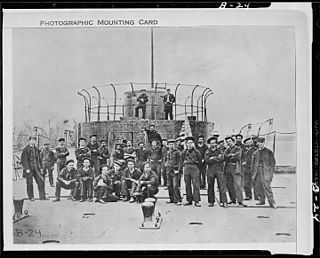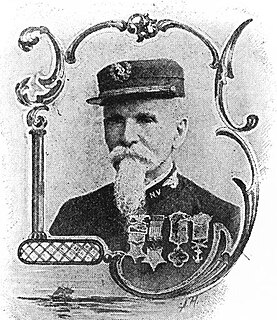Related Research Articles

USS Minnesota was a wooden steam frigate in the United States Navy. Launched in 1855 and commissioned eighteen months later, the ship served in east Asia for two years before being decommissioned. She was recommissioned at the outbreak of the American Civil War and returned to service as the flagship of the North Atlantic Blockading Squadron.

USS Galena was a wooden-hulled broadside ironclad built for the United States Navy during the American Civil War. The ship was initially assigned to the North Atlantic Blockading Squadron and supported Union forces during the Peninsula Campaign in 1862. She was damaged during the Battle of Drewry's Bluff because her armor was too thin to prevent Confederate shots from penetrating. Widely regarded as a failure, Galena was reconstructed without most of her armor in 1863 and transferred to the West Gulf Blockading Squadron in 1864. The ship participated in the Battle of Mobile Bay and the subsequent Siege of Fort Morgan in August. She was briefly transferred to the East Gulf Blockading Squadron in September before she was sent to Philadelphia, Pennsylvania for repairs in November.

The first USS Lehigh was a Passaic-class monitor launched 17 January 1863 by Reaney, Son & Archbold, Chester, Pennsylvania, under a subcontract from John Ericsson; and commissioned at Philadelphia Navy Yard 15 April 1863, Commander John Guest in command.
John Lafferty or Laverty was a sailor in the U.S. Navy during the American Civil War and is one of only 19 people in history to receive the Medal of Honor twice.
Pinkerton Ross Vaughn, Sr. was a United States Marine Corps sergeant during the American Civil War. He was awarded the nation's highest military decoration for valor—the Medal of Honor, for his actions aboard the USS Mississippi during a battle with Confederate artillery batteries at Port Hudson, Louisiana on March 14, 1863. Vaughn is one of the first two Marines to be awarded the Medal of Honor in the history of the Marine Corps.

John Freeman Mackie was a United States Marine Corps sergeant during the American Civil War. He was awarded the nation's highest military decoration for valor—the Medal of Honor, for his actions aboard the USS Galena during the battle with Confederate Marines and artillery batteries at Fort Darling near Richmond, Virginia, on May 15, 1862. He is one of the first two Marines to be awarded the Medal of Honor, and is considered to be the first Marine to receive the Medal of Honor in the history of the Marine Corps.
USS Mount Washington was a steamer purchased by the Union Navy during the American Civil War. She was used by the Union Navy as a gunboat assigned to patrol Confederate waterways.

Thomas H. Cripps was a native of Philadelphia, Pennsylvania, who became a U.S. Medal of Honor winner during the American Civil War. While serving in the Union Navy as a quartermaster aboard the USS Richmond, he operated one of that's ship's guns under heavy enemy fire for two hours during the Battle of Mobile Bay, Alabama on August 5, 1864, helping to damage the CSS Tennessee and destroy artillery batteries of the Confederate States Army at Fort Morgan, even as the enemy's shell and shot damaged his ship and killed several of his fellow crewmen. For those actions, he was awarded his nation's highest honor for bravery on December 31, 1864.

Nicholas Lear was a Quartermaster in the Union Navy and a Medal of Honor recipient for his actions in the American Civil War.
James Martin II was a native of Ireland who served in the U.S. Marine Corps during the mid-19th century. Rising up through the ranks from private to sergeant while fighting for the federal government of the United States (Union) during the American Civil War, he displayed conspicuous bravery on August 5, 1864, while serving aboard the USS Richmond. Operating one of that ship's guns under heavy enemy fire for two hours during the Battle of Mobile Bay, Alabama, he helped to damage the CSS Tennessee and destroy artillery batteries of the Confederate States Army at Fort Morgan, even as the enemy's shell and shot damaged his ship and killed several of his shipmates. In recognition of his gallantry, he was presented with the Medal of Honor, the United States' highest award for valor, on December 31, 1864.
Robert B. Wood was a Union Navy sailor in the American Civil War and a recipient of the U.S. military's highest decoration, the Medal of Honor, for his actions at the Battle of Suffolk.
Alexander H. Truett (1833–1898) was a Union Navy sailor in the American Civil War and a recipient of the U.S. military's highest decoration, the Medal of Honor, for his actions at the Battle of Mobile Bay.
Robert Teleford Clifford was a Master-at-Arms in the United States Navy who fought in the American Civil War. Clifford received the country's highest award for bravery during combat, the Medal of Honor, for his action aboard the USS Shokokon at New Topsail Inlet near Wilmington, North Carolina on 22 August 1863. He was honored with the award on 31 December 1864.
James H. Brown (1826–1905) was an officer in the United States Navy who served as quartermaster aboard the USS Albatross during the American Civil War. He received his nation's highest award for bravery during combat, the U.S. Medal of Honor, for his actions aboard ship during the Union Navy's May 4, 1863 attack on Fort DeRussy in an attempt to disrupt the hold by Confederates over the Red River region of Louisiana. That award was conferred on April 16, 1864.
Henry Thielberg (1833–?) was a Union Navy sailor in the American Civil War who received the U.S. military's highest decoration, the Medal of Honor, for his actions at the Battle of Suffolk.

Matthew McClelland was a United States Navy sailor and a recipient of the United States military's highest decoration the Medal of Honor for his actions in the American Civil War.
Charles H. Smith was a Union Navy sailor in the American Civil War and a recipient of the U.S. military's highest decoration, the Medal of Honor, for his actions aboard the USS Rhode Island.
Samuel Woods was an American sailor in the Union Navy and recipient of the Medal of Honor for actions in the American Civil War.
John Kelley was an Irish born recipient of the Medal of Honor and sailor in the Union Navy during the American Civil War.
Charles Kenyon was an American recipient of the Medal of Honor who received the award for his actions during the American Civil War whilst serving with the Union Navy.
References
- 1 2 "Robert Jordan - Recipient -". valor.militarytimes.com. Retrieved 2022-02-27.
- ↑ "Jordan, Robert". The National Medal of Honor Museum. Retrieved 2022-02-27.
- 1 2 3 "Robert Jordan | U.S. Civil War | U.S. Navy | Medal of Honor Recipient". Congressional Medal of Honor Society. Retrieved 2022-02-27.
- ↑ United States. Congress., Senate. Committee on Veterans' Affairs (1979). Medal of Honor Recipients, 1863-1978: "In the Name of the Congress of the United States". U.S. Government Printing Office. p. 134.